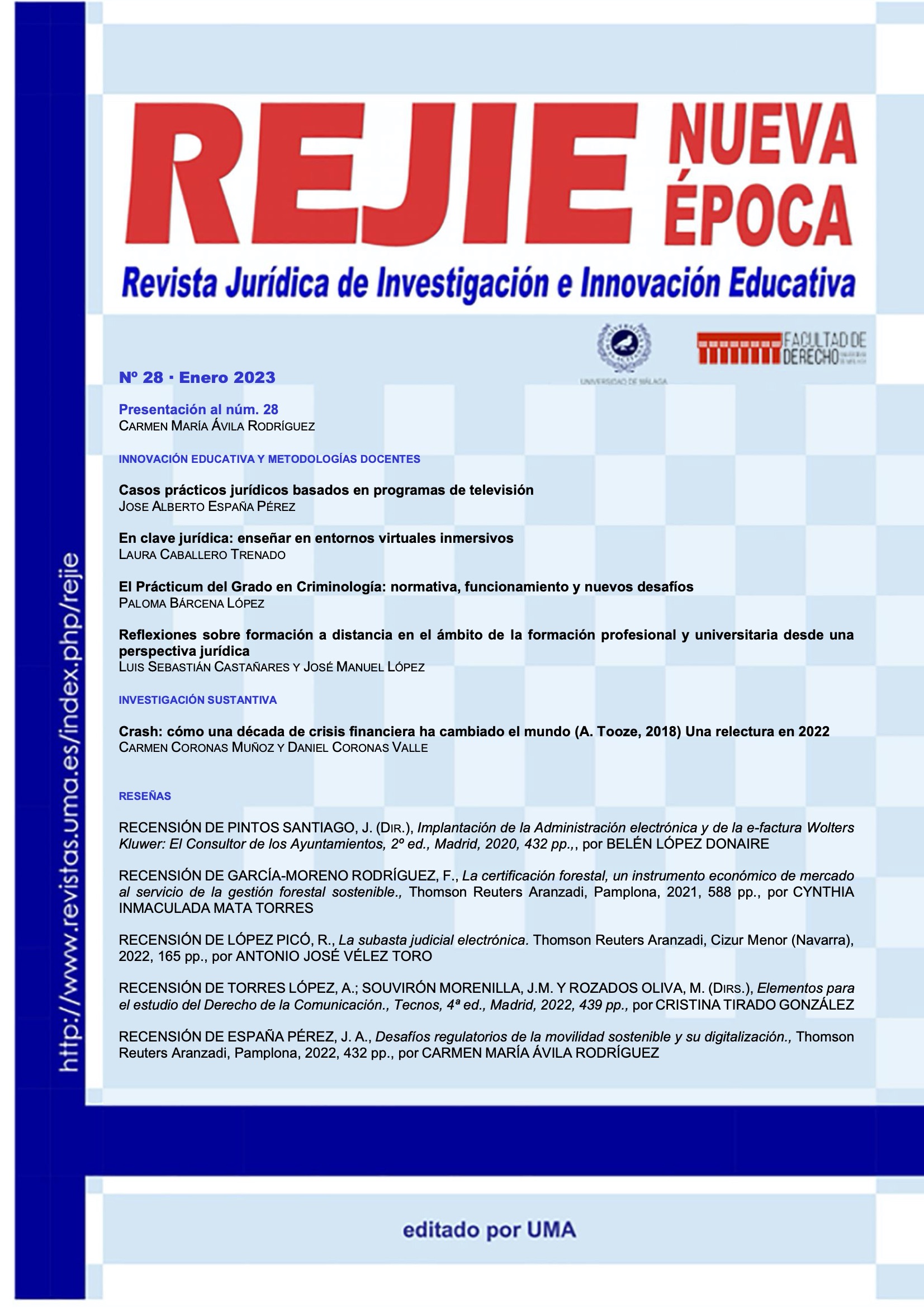Reflections on distance learning in the field of vocational and university education from a legal perspective
DOI:
https://doi.org/10.24310/rejie.vi28.16141Keywords:
e-learning, vocational training, university training, legal subjects, lifelong learningAbstract
This article analyses the legal development of distance learning in Spain, both in the field of Vocational Training and at university level. Particularly, the analysis is carried out with a focus on legal matters, not only in terms of university degree courses, but also in terms of specific professional modules such as Formación y Orientación Laboral.
Firstly, the legal framework of distance learning in Spain is examined, both in the Vocational Training system, which takes into account the most recent legislation, and in the consolidated national regulations on distance learning in the university area. Next, methodologies and resources related to e-learning of legal contents in the aforementioned fields are detailed. Finally, future prospects for the development of e-learning are discussed, valuing it as an effective training tool for lifelong learning.
The main goal of this work is to make a global analysis of the educational system in its university and vocational training areas, with special emphasis on national legislation and on the evolution that the teaching of legal sciences has undergone with the progressive incorporation of new technologies in general, and remote training in particular.
Downloads
Metrics
References
ÁVALOS DÁVILA, CAROLINA; ZURIÑE ARBAIZA, NAGORE; AJENJO SERVIA, P. (2021): “Calidad educativa y nuevas metodologías de enseñanza-aprendizaje: retos, necesidades y oportunidades para una visión disruptiva de la profesión docente”. En Revista innovaciones educativas. Número 35.
BASTANTE GRANELL, V. Y MORENO GARCÍA, L. (2020): “Plataforma digital ludoteca jurídica: una apuesta por la gamificación en Derecho” en REJIE: Revista Jurídica de Investigación e Innovación Educativa. Nº. 21.
BAUTISTA, A. Y ALBA, C. (1997): “¿Qué es Tecnología Educativa?: Autores y significados”, Revista Pixel-bit, nº9, 4.
CEBREIRO LÓPEZ, B.; FERNÁNDEZ MORANTE, M. C. Y ARRIBI VILELA, J. (2017): “Formación profesional a distancia: corriendo en la dirección equivocada” en Pixel-Bit: Revista de medios y educación. Nº. 50.
Comisión de Regulación de las Comunicaciones del Gobierno de Colombia. Disponible en https://www.crcom.gov.co/es/noticias/comunicado-prensa/en-2021-colombia-alcanzo-38-millones-accesos-internet-movil-y-84
GARCÍA ESTÉVEZ, I. (2019): La Formación a distancia en los ciclos de Formación Profesional. Perspectiva del profesorado. Universidad de Cantabria.
GARCÍA MARCOS, C. J. Y CABERO ALMENARA, J. (2016); “Evolución y estado actual del e-learning en la Formación Profesional española” en RIED: revista iberoamericana de educación a distancia. Volumen 19, Nº. 2.
Instituto Nacional de Estadística: Información relativa a los hogares que tienen acceso a Internet y hogares que tienen ordenador. Disponible en https://www.ine.es/ss/Satellite?L=es_ES&c=INESeccion_C&cid=1259925529799&p=%5C&pagename=ProductosYServicios%2FPYSLayout¶m1=PYSDetalle¶m3=1259924822888
LARO GONZÁLEZ, M. E. (2020): “Innovar enseñando: la educación del futuro. Las TICS como factor motivador en la enseñanza” en REJIE: Revista Jurídica de Investigación e Innovación Educativa. Nº. 21.
MARQUINA, R.; ALVARADO, A. Y BENÍTEZ, E. (2021): “E-learning en tiempos de COVID. La experiencia del CLUSTER de Enseñanza-Aprendizaje AULACIETE 20202021” en Trayectorias Universitarias. Vol. 7. Nº. 12.
MARTÍNEZ AGUT, M. P. (2022): “Nueva ley de la Formación Profesional (Ley Orgánica 3/2022): aportaciones y reflexiones desde la profesión docente en Quaderns d´animació i Educació Social. Nº. 36.
MARTÍNEZ GARCÍA, B.; CARAYOL DENGRA, R; MARTÍNEZ CASTILLO, E. (2021); “Actualización pedagógica del profesorado de Educación Secundaria”, en III Congreso Interdisciplinar de Jóvenes Investigadores. AJIUM.
MARTÍNEZ GOIKOLEA, E.; VÁZQUEZ CANO, E. Y LÓPEZ MENESES, E. (2022): “Marco legal de la educación a distancia en la formación profesional española”, en López Belmonte, J. et al. Procesos formativos y experiencias educativas innovadoras, pp. 9-52.
RANDO BURGOS, E. (2021): “La necesaria formación del profesorado universitario ante la docencia virtual” en REJIE: Revista Jurídica de Investigación e Innovación Educativa. Nº. 24.
RAYÓN BALLESTEROS, M.C. Y LÓPEZ JIMÉNEZ, J.M. (2020): “La enseñanza del derecho y su tránsito hacia la formación on line: el avance necesario de la presencialidad a la asincronía”. En La Razón Histórica: revista hispanoamericana de historia de las ideas políticas y sociales.
RUIZ RODRÍGUEZ, R. (2022): “Estrategias docentes para la adaptación de la docencia en ciencias jurídicas al entorno on line y semipresencial”. En Revista Jurídica de Investigación e Innovación Educativa. Número 26.
SÁEZ ARENAS, J. (2010): Informe sobre la Formación Profesional a distancia en España” en RED: Revista de Educación a Distancia. Nº. 25.
SANTANA BONILLA, P. J. Y GARCÍA DE PAZ, S. (2021): “La Transición a entornos de educación virtual en un contexto de emergencia sanitaria: estudio de caso de un equipo docente en Formación Profesional Básica” en RED: Revista de Educación a Distancia. Nº. 65.
TARDÍO PATO, J. A. (2022): “Los tipos de evaluación en las enseñanzas jurídicas. Como calificación y como medio de aprendizaje” en REJIE: Revista Jurídica de Investigación e Innovación Educativa. Nº. 27.
TORRES CANCELA, S. (2012): “El uso de recursos on-line en el módulo de formación y orientación laboral de los ciclos formativos de FP” en Pixel-Bit: Revista de medios y educación. Nº. 40.
WEHRLE MARTÍNEZ, A. (2020). Educación en contextos de COVID-19: requerimientos mínimos para una educación a distancia. Observatorio Educativo Ciudadano, https://www.observatorio.org.py/especial/26
Additional Files
Published
How to Cite
Issue
Section
License
Sin perjuicio de lo dispuesto en el Texto Refundido de la Ley de Propiedad Intelectual, aprobado por Real Decreto Legislativo 1/1996, de 12 de abril, y conforme al mismo, los autores/as ceden a título gratuito, de modo no exclusivo y sin límite temporal los derechos para difundir, reproducir, comunicar y distribuir, en cualquier formato actual o futuro (papel o electrónico), a la Universidad de Málaga (UMA), a fin de que sea publicado en REJIE Nueva Época.
Al realizar el envío, el autor declara que el contenido esencial del mismo no ha sido publicado ni se va a publicar en ninguna otra obra o revista mientras esté en proceso de evaluación en REJIE Nueva Época, comprometiéndose en todo caso a comunicar de inmediato al equipo editorial de la revista cualquier proyecto de publicación de dicho texto, y citando expresamente a la revista en el nuevo proyecto.
Todos los contenidos publicados por REJIE Nueva Época están sujetos a la licencia de Creative Commons Reconocimiento 4.0 Internacional, cuyo texto completo se puede consultar en https://creativecommons.org/licenses/by/4.0/legalcode
Conforme a la misma, se permite la copia, distribución, comunicación pública, obras derivadas y el uso comercial de los contenidos siempre que la fuente y el autor del texto sean citados Así, cuando el autor/a envía su colaboración está explícitamente aceptando esta cesión de derechos de edición y de publicación.
Es responsabilidad de los autores obtener los permisos necesarios de las imágenes que están sujetas a derechos de autor.







20.png)
